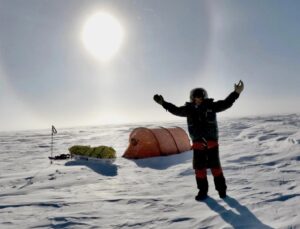In a recent interview, Italian mountaineer Reinhold Messner said that the most important tool for the adventurer is the mind. Following up on that thought, ExWeb contacted Nathan Smith, a UK-based exercise psychologist who specializes in adventure psychology.
Smith is a researcher at the University of Manchester and a fellow of the Royal Geographical Society. His research focuses on the psychology of performance and health in challenging settings. This includes research on topics such as stress, coping, emotion and mental health in high-risk settings; and equally importantly, re-adjustment following exposure to extreme experiences. Over the past few years, he has worked with adventurers in deserts, mountains and polar regions, Antarctic scientists, space simulation participants, elite military personnel and extreme medics.
ExWeb: How did you get into the field of adventure psychology?
I initially trained in exercise science and then sport and exercise psychology. My doctoral research was on motivation in sport. Afterward, I wondered how I could explore extreme environments in which motivation is truly critical. Eventually, I became interested in understanding end-to-end performance and health in extreme environments — capturing what happens before, during and after expeditions.
ExWeb: How long have scientists been studying the psychology of adventure?
Most of the early work stemmed from the military: in particular, studies from World Wars I and II, documenting the psychological responses to severe stress. Not all of them bad: For example, many people talked about the War [WWII] as the most exciting, fulfilling and purposeful part of their lives. Of course, that wasn’t the experience for all.
Academic studies historically focused on people in the polar regions. This was stimulated by the first permanent settlements in those regions. Then followed the space age, and the importance of preparing astronauts to fly to the moon and beyond. Nowadays, extreme environment psychology ranges from Antarctica and space to high-risk occupations, including military, wilderness firefighters, anti-poaching groups, security and law-enforcement and those who go to far-flung settings for fun!

Mentoring the next generation of expedition medics. Smith working with students of the Extreme Medicine MSc program at the University of Exeter. Photo: Nathan Smith
ExWeb: What are the most important psychological skills for performing in extreme environments?
This is a tough question because it largely depends on the activity. For example, you might not be good at living in confined settings (e.g. a Mars simulation study) but you may be a valuable member of a mountaineering team. There are some good historic examples of this. During WWII, there are accounts of people not selected for the Special Operations Executive, which required concealment and covert action, but became valuable members of the Special Air Service, which needed brave, high-performing people to complete missions of derring-do. In general, most current research emphasizes the importance of conscientiousness, self-motivation and the ability to cooperate with others. Groups doing repetitive and monotonous tasks also need to tolerate boredom and withstand low sensory conditions. Those in uncertain and changeable environments should be adaptable.
ExWeb: Do these characteristics differ in team versus solo adventures?
This is an area that needs much more work. Despite what we might think, people who do solo expeditions are not all reclusive introverts. In fact, they may actually be good at accessing social support, considering their limited social contact. For relatively short expeditions, solo travelers report the challenges of staying motivated and up-regulating their arousal. They may also need emotional stability, since they’re constantly at risk and need to be self-sufficient. A common motive across solo expeditioner accounts is the desire for achievement, in the sense of self-discovery and testing personal limits.
ExWeb: Are these skills transferable across different types of adventures, for example, both polar and ocean?
To some extent. But recent studies on resilience and mental toughness suggest that sometimes these capacities are context specific. For example, mountaineers value achievement much more highly, than say, scientists living for long periods in Antarctica.

Can you rely on your teammates? An agreeable and cooperative nature is vital to success in extreme settings. Photo: Nathan Smith
ExWeb: Can you learn these skills?
Yes. In space missions, for example, they have identified a range of expeditionary behaviours that are important for small teams to train at. These includes aspects of leadership, decision-making, communication, conflict resolution, teamwork, situational awareness, cross-cultural awareness and self-management.
ExWeb: What is your favourite example from adventure history to illustrate some of the above ideas?
Obviously, I enjoy the stories of Scott and Shackleton. Thesiger, but more so TE Lawrence, are big inspirations because of their travels in the Middle East. This is an area I am really interested in and would love to do more work on teams in desert settings. For me, the best examples of the psychological side of extremes comes from the literature on military operations and high-altitude
mountaineering. The old books on the Long Range Desert Group and the SAS/SBS [Special Air Service and Special Boat Service] during WWII are rife with the challenges but also the fun of life in the desert. Mountaineering literature captures the essence of risk in the mountains. Jim Whittaker writes very eloquently on the subject, but my personal favourite is Rob MacFarlane and his book, Mountains of the Mind.

Flying solo? People who do solo expeditions are not all reclusive introverts. In fact, they may actually need to be good at accessing social support. Photo: Nathan Smith
ExWeb: Where can we find out more about your work?
I’m the founder of the online school for psychology in extreme environments, In Extremis.






